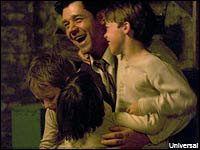|

Cinderella Man
A Review by Tom Condon, OP
(St. Martin Province)
FILM SYNOPSIS
Russell Crowe reunites with 'A Beautiful
Mind' director Ron Howard in this story inspired by the
life of legendary athlete Jim Braddock, a once-promising
light heavyweight boxer forced into retirement after a string
of losses in the ring. As the nation enters the darkest
years of the Great Depression, Braddock accepts a string
of dead-end jobs to support his wife, Mae (Renée
Zellweger), and their children, while never
totally abandoning his dream of boxing again.

Three
years ago, producer Brian Grazer, director
Ron Howard, writer Akiva Goldsman, and actor Russell Crowe
collaborated on the Oscar winning film, A Beautiful Mind.
They are back with the current film, Cinderella Man, the
story of Depression-era boxer James Braddock. Like their
previous collaboration, Cinderella is dramatically compelling,
well acted, handsome period picture. In addition to Crowe
in the lead, the excellent cast includes Renee Zellweger
as Mae, Braddock’s understanding wife, Paul Giamatti
(so good in last year’s Sideways) as manager Joe Gould,
and Craig Beirko as the heavyweight champion Max Baer.
The film opens in 1928. Jim, a top contender
for the title, wins his bout at Madison Square Garden, and
comes home to the family’s attractive New Jersey house.
Everything is looking up. Then the Depression hits. It’s
1933 when the story resumes. The Braddocks are struggling
in a tiny basement apartment. After a couple of bad fights,
and a broken hand, Jim has fallen so low in the boxing ranks
that he can only get an occasional fight in a rundown club.
After a poor performance in the ring, the boxing commission
even strips Jim of his license. Braddock must work on the
docks, and even has to accept welfare to feed his family
and keep the lights on. The children are sick, and Mae considers
letting them stay with relatives temporarily until things
get better. At this point, Jim goes back to the boxing commissioners
in New York, literally begging for a handout.
When it looks as though Jim will never fight
again, Gould is able to arrange a one-time, last minute
match with a title contender when the scheduled opponent
is forced to withdraw. Miraculously, Jim is victorious,
once again finding the courage and tenacity of his glory
years. Jim begins to believe in himself again, and starts
to win against top opponents, and soon earns a title shot
against the arrogant, brutal Baer in 1935.
The story is rather formulaic. Likeable,
spirited underdog against the rich, nasty champ. We’ve
seen it all before. The Depression-era setting and theme
that Braddock wasn’t fighting for himself, but for
all the down and out people who identified with him, reminded
me of Seabiscuit. Braddock’s pastor even turns on
a radio in his parish church where people have turned out
to pray for him.
 At
this point, I wondered if the creative film makers were
laying it on too much. Was Braddock too good to be true?
Even in the worst of times, he’s never less than virtuous.
Perhaps a look at the years when he fell from the ranks
would have shown us a darker side to him. ( I didn’t
fully understand the reason for his fall.) On the other
hand, was Baer really as bad as he was portrayed? His son
Max, Jr., (he played Jethro on The Beverly Hillbillies)
has protested about his father’s depiction. We hear
repeatedly that Baer killed two men in the ring. Is the
audience being set up for the big “hero/villain”
main event? At
this point, I wondered if the creative film makers were
laying it on too much. Was Braddock too good to be true?
Even in the worst of times, he’s never less than virtuous.
Perhaps a look at the years when he fell from the ranks
would have shown us a darker side to him. ( I didn’t
fully understand the reason for his fall.) On the other
hand, was Baer really as bad as he was portrayed? His son
Max, Jr., (he played Jethro on The Beverly Hillbillies)
has protested about his father’s depiction. We hear
repeatedly that Baer killed two men in the ring. Is the
audience being set up for the big “hero/villain”
main event?
Since I’m not familiar with boxing history, So I will
take the movie on its own merits. What lifts Cinderella
Man above its formula are the fine performances (Giamatti
nearly steals the picture as the emotional manager), and
its rich attention to period detail. In its way, Cinderella
Man takes us back to a more innocent time, long before we
had been jaded by all the scandals of recent years. On a
hot summer day, that’s a nice place to be.
Tom Condon, O.P |





